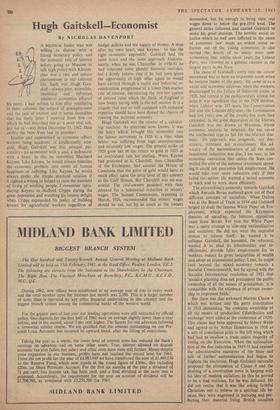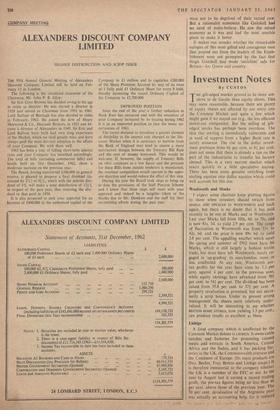Hugh Gaitskell—Economist
By NICHOLAS DAVENPORT Erudite and experienced in economic affairs without being academic or intellectually arro- gant, Hugh Gaitskell was that unusual per- sonality—an economist with a soul, a technocrat with a heart. In this he resembled Maynard Keynes. Like Keynes, he would always translate the economic problem into terms of human happiness or suffering. Like Keynes, he would always prefer the simple practical solution if it righted a wrong or helped to raise the standard of living of working people. I remember intro- ducing Keynes to Stafford Cripps during the great depression and watching his intense delight when Cripps expounded his policy of building houses for agricultural workers regardless of budget deficits and the supply of money. A man after my own heart, said Keynes; he has the right economic approach! Gaitskell had the same heart and the same approach. Unfortu- nately, when he was Chancellor in 1950-51 he had inherited some ghastly financial mistakes, but 1 firmly believe that if he had been given the opportunity of high office again he would have carried through a social and industrial re- construction programme at a lower-than-market rate of interest, introducing the two-tier system of interest rates which the Bank of England is now feebly toying with in the bill market. It is a tragedy that one so well equipped with technical expertise should have been denied the chance of running the national economy.
Hugh Gaitskell was the reverse of a calculat- ing machine. As everyone now knows, it was the heart which brought this economist into the labour movement in 1926 at a time when labour was suffering from high unemployment and miserably low wages. The general strike of 1926 grew out of the return to gold in 1925 at an overvalued rate for sterling. When Keynes had protested at it, Churchill, then Chancellor of the Exchequer, had assured the House of Commons that the price of gold would have as much effect upon the price level of this country as the Gulf Stream. But Churchill was no eco- nomist. The coal-owners persisted with their demand for a substantial reduction in miners' wages. The Samuel Commission: reporting in March, 1926, recommended that miners' wages should be cut, not by as much as the owners
demanded, but by enough to bring their real wages down to below the pre-1914 level. The general strike followed and caused Gaitskell to make his great decision. The terrible social in- justice which he had seen inflicted in the name of economic 'law' made an ardent social re- former out of the young economist. It also moved the hearts of so many more non- economists that within three years the Labour Party was returned in a general election as the largest party in the State.
The cause of Gaitskell's entry into the labour movement was to have an important result when he became leader of the party. He came in as a social and economic reformer when the workers, discouraged by the failure of industrial action in 1926, had turned to the parliamentary system for help. It was significant that in the 1929 election, when Labour won 287 seats, the Conservatives 260 and the Liberals fifty-nine, the Communists had lost every one of the twenty-five seats they contested. In the great depression of the Thirties Gaitskell was not drawn to Marxism, whose economic analysis he despised. fle was never the intellectual type to fall for the Marxist doc- trine: his approach was pragmatic not doc- trinaire, reformist not revolutionary. His ad- vocacy of the nationalisation of all the main investment industries was due, I am sure, to his economic conviction that unless the State con- trolled the core of the national investment spend- ing it could not guarantee full employment. He would take over more industries only if they failed the nation. He wanted a mixed economy to work and to work more efficiently.
The extraordinary animosity towards Gaitskell which Aneurin Bevan nurtured grew out of their different concepts of 'socialism.' When Dalton was at the Board of Trade in 1944 and Gaitskell helped to draft the famous White Paper on Em- ployment, which expressed the Keynesian theories of spending, the bitterest opposition came from Bevan. For him the White Paper was a naïve attempt to side-step nationalisation and socialism. He did not want the capitalist system to reform itself: he wanted it to collapse. Gaitskell, the humanist, the reformer, wanted it to shed its inhumanities and in- efficiencies, provide fuller employment for its workers, reduce its gross inequalities of wealth and adopt an expansionist policy. Later, he might look beyond the mixed economy towards a Socialist Commonwealth, but he agreed with the Socialist International resolution of 1951 that `socialist planning does not presuppose the public ownership of all the means of production: it is compatible with the existence of private owner- ship in important fields.'
But there was that awkward Marxist Clause 4 which was written into the party constitution in 1918 demanding 'the common ownership of all the means of production' (`distribution and exchange' were added at the conference of 1929). This clause had been approved by Sidney Webb and agreed to by Arthur Henderson in 1918 as a sort of consolation prize to the left wing which had had to swallow a trade union majority of voting on the Executive. When the nationalisa- tion of the five industries in 1945-51 had strained the administrative resources of the State and talk of further nationalisation had begun to frighten the electorate, Hugh Gaitskell naturally proposed the elimination of Clause 4 and the drafting of a constitution more in keeping with his idea of modern socialism. In this he proved to be a bad tactician, for he was defeated. He did not realise that it was like asking faithful Christians not to believe in a spiritual life be- cause they were engrossed in pursuing and per- fecting their material living. British socialists
were not to be deprived of their sacred coy/. But a rationalist economist like Gaitskell had no need of make-believe. He saw the mixed economy as it was and had the most sensible plans to make it better.
It makes one wonder whether the remarkable eulogies of this most gifted and courageous man that poured out from the leaders of the Estab- lishment were not prompted by the fact that Hugh Gaitskell had made 'socialism' safe for Britain—for Queen and country.



































 Previous page
Previous page